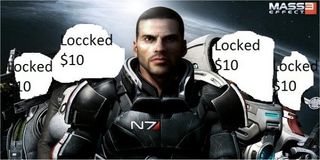Beware Of $60 Fee-To-Play Games With Microtransactions

Just recently CD Projekt RED won some more internets from the gaming community when they said that they didn't believe in the whole cash shop, microtransaction affair that other bigger publishers are indulging in with their $60 retail games. Following on this bit of insight, Jim Sterling released a new Jimquisition forewarning gamers about the impending scamming of $60 games with fee-to-play restrictions.
Now, before getting into this (for those of you who didn't already watch the video) take note that this is not about free-to-play games – while free-to-play games have their own virtues and vices, this is not about games that have no barrier to entry on a financial front but boast a microtransaction store. I think it's safe to say that we all know and understand the free-to-play model and whether we agree with it or not, it's at least self-contained in the paradigm of playing for free but usually having to pay-to-win. It's the nature of the free-to-play beast.
What is not okay, however, are premium retail games with a sizable price-tag and features locked behind pay-walls. We were introduced to the worst kind of fee-to-play microtransaction machinations when Capcom tried their hand at it last year with Street Fighter X Tekken, blatantly exposed by hackers and modders and made public for the world to see. Essentially, it was a $60 game with more than $100 worth of DLC locked away on the disc.
I also found it highly disturbing that there are more advertisements in some AAA games for microtransactions than there are in free-to-play games. For instance, there are fewer cash shop ads in Warframe, a free-to-play game, than there are in both Saints Row: The Third and Sleeping Dogs.

The main problem that gamers had with this cash-shop gouging approach to retail games is that the whole point of the retail price and a price of entry to begin with is so that you can buy the game in one go and get the full thing. You don't buy a movie DVD and find out that the ending, the subtitles, behind-the-scenes features and aspect ratios are sold separately, just the same as you don't buy a music album and realize that the singles of the popular songs from the album are sold separately.
The thing with video games is that we're beginning to see a rise in retail games adopting cash shop-style mentalities. Many gamers rebelled against this when EA made it known that they would be including microtransactions in all their games and then, after enough public reproach, backtracked the comments and said it was only for mobile titles.
CINEMABLEND NEWSLETTER
Your Daily Blend of Entertainment News
The thing is, gaming is a hobby centered around skill and completion. Big AAA publishers have realized that they can gouge gamers by having the game artificially difficult and selling “skill” based items from the cash shop, such as the nefarious DLC trinkets available for Saints Row: The Third. AAA publishers also know that they can sell “completion” to a gamer by separating key aspects of the experience, such as EA with From Ashes and Capcom with Asura's Wrath true ending.
Selling key components of games to the core audience on top of the $60 price tag – as Sterling puts it – is disgusting.
I felt pretty bad for all the DLC I bought for some AAA games, realizing that I was essentially buying features that was standard in most other games that we could properly label as being “complete”.
As Gaming Blend's own Pete Haas brings out, games like Skyrim and Grand Theft Auto: Episodes From Liberty City offers DLC that feels complete and hearty, and as if they properly expand the game's universe and a player's enjoyment of that universe.
Sadly, Jim is right in saying that the AAA business will continue to wallet-ravage the funds of gamers in an attempt for more, more and more.
Despite having record revenue margins [via Tech Radar Daily], the profits aren't readily catching up for some of the big players due to the over-spending and massive marketing budgets, so even 3.4 million copies sold in three weeks isn't enough to save some companies.
So how do the big boys plan to fix this? More fee-to-play microtransactions and cash shops littered throughout $60 retail games... or in the case of EA, £54.99 retail games. Gamers will definitely need to beware of publishers utilizing these contrivances, especially heading into next-gen where things could potentially become worse in the AAA arena.
Staff Writer at CinemaBlend.

Young Sheldon Further Set Up Georgie And Mandy's First Marriage Spinoff, And I Really Hope One Character Is Along For The Ride

Law And Order's Dixon Had To Make An Impossible Choice In The Latest Episode, And I'd Love A Part 2

Netflix’s Unfrosted Review: Jerry Seinfeld’s Directorial Debut Is Inspired Comic Anarchy
Most Popular







